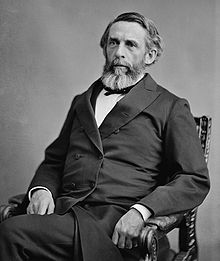George S. Boutwell
| George S. Boutwell | |
|---|---|

Portrait by Brady-Handy studio, c. 1870s
|
|
| 28th United States Secretary of the Treasury | |
|
In office March 12, 1869 – March 16, 1873 |
|
| President | Ulysses S. Grant |
| Preceded by | Hugh McCulloch |
| Succeeded by | William Adams Richardson |
|
United States Senator from Massachusetts |
|
|
In office March 17, 1873 – March 3, 1877 |
|
| Preceded by | Henry Wilson |
| Succeeded by | George Frisbie Hoar |
| 20th Governor of Massachusetts | |
|
In office January 11, 1851 – January 14, 1853 |
|
| Lieutenant | Henry W. Cushman |
| Preceded by | George N. Briggs |
| Succeeded by | John H. Clifford |
| Member of the U.S. House of Representatives from Massachusetts's 7th district |
|
|
In office March 4, 1863 – March 12, 1869 |
|
| Preceded by | Daniel W. Gooch |
| Succeeded by | George M. Brooks |
| Member of the Massachusetts House of Representatives | |
|
In office 1842–1844 1847–1850 |
|
| Personal details | |
| Born |
George Sewall Boutwell January 28, 1818 Brookline, Massachusetts, U.S. |
| Died | February 27, 1905 (aged 87) Groton, Massachusetts, U.S. |
| Political party |
Democratic Republican |
| Spouse(s) | Sarah Adelia Thayer |
| Profession | Politician, lawyer, teacher |
| Signature | |
George Sewall Boutwell (January 28, 1818 – February 27, 1905) was an American politician, lawyer, and statesman from Massachusetts. He served as Secretary of the Treasury under President Ulysses S. Grant, the 20th Governor of Massachusetts, a Senator and Representative from Massachusetts and the first Commissioner of Internal Revenue under President Abraham Lincoln. He was a leader in the impeachment of Andrew Johnson.
Boutwell, an abolitionist, is primarily known for his leadership in the formation of the Republican Party, and his championship of African American citizenship and suffrage rights during Reconstruction. As U.S. Representative, he was instrumental in the construction and passage of the Fourteenth and Fifteenth Amendments to the United States Constitution. As Secretary of Treasury, he made needed reforms in the Treasury Department after the chaos of the American Civil War and the impeachment trial of President Andrew Johnson. He controversially reduced the national debt by selling Treasury gold and using greenbacks to buy up Treasury bonds, a process that created a cash shortage. Boutwell and President Grant thwarted an attempt to corner the gold market in September 1869 by releasing $4,000,000 of gold into the economy. As U.S. Senator, Boutwell sponsored the Civil Rights Act of 1875.
...
Wikipedia
